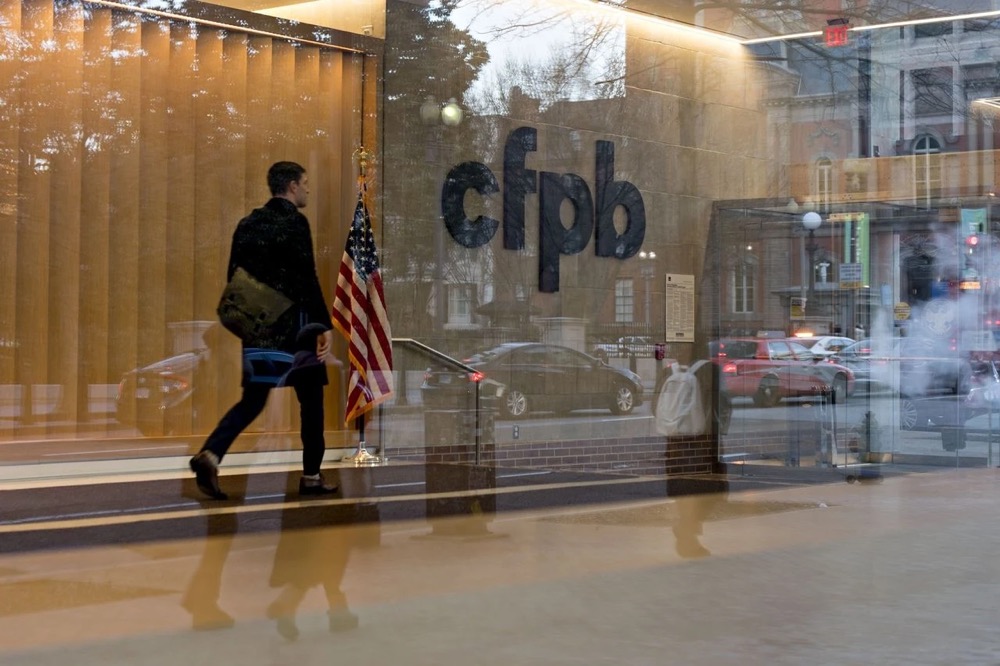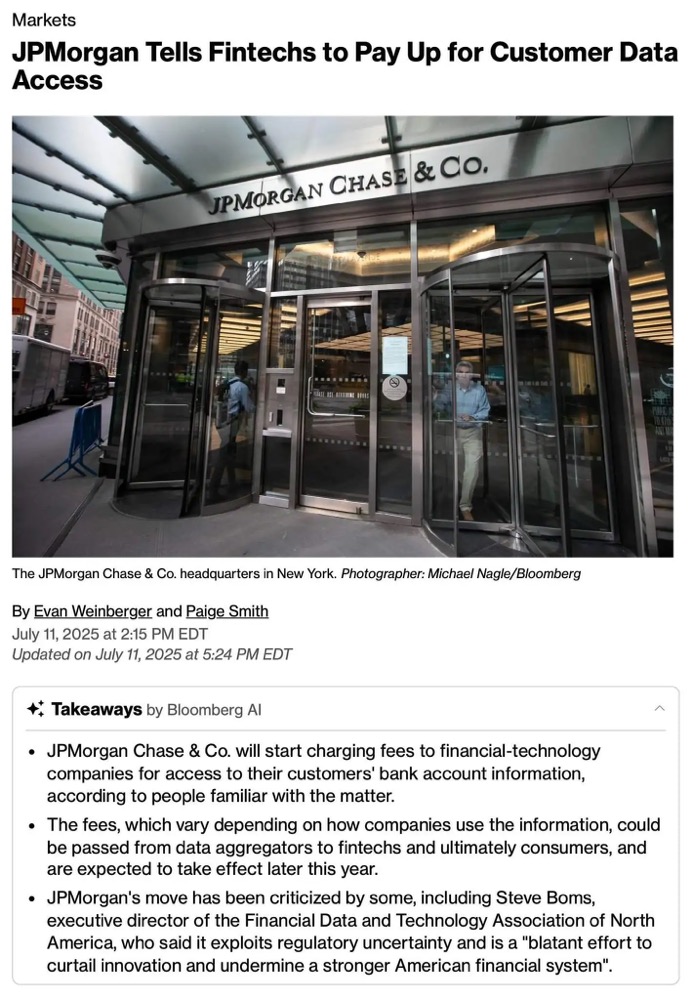Written by: Wenser, Odaily Planet Daily
The conflict between traditional financial giants and cryptocurrency platforms has resurfaced, with the main players being two major industry titans from the United States—one side is JPMorgan, known as the "leader of investment banks"; the other is the established cryptocurrency exchange, Gemini. Around 2 AM Beijing time on July 26, Gemini co-founder Tyler Winklevoss posted angrily accusing JPMorgan of refusing to provide data services to Gemini due to his previous statements, attempting to engage in unfair competition and stifle fintech companies and crypto platforms. Following this news, many in the crypto industry recalled the impact of the previous "Operation ChokePoint 2.0" on cryptocurrency companies. Odaily Planet Daily will briefly outline the "financial persecution 2.0" faced by Gemini in this article for readers' reference.
Gemini Faces JPMorgan's "Strangulation": When Bank Data Becomes a Competitive Tool
As a crossover between traditional finance and the cryptocurrency industry, user data has always been a top priority in the business of traditional banks and crypto platforms. After all, the more comprehensive the KYC information, the more corresponding safeguards are in place for user risk preferences, asset sizes, and security levels, leading to clearer user profiles and facilitating platform operations.
The focus of the dispute between Gemini and JPMorgan lies in bank data.
Just as Elon Musk turned Twitter's API into one of its profit sources after taking over, and Reddit charges clients and third parties for accessing platform data, the "data business" has always been a part of the vaguely defined platform economy. After Tyler Winklevoss criticized on July 20 in a post that "JPMorgan deprived Gemini of the right to access bank data for free through the third-party platform Plaid and instead charged fintech companies exorbitant fees for data access," JPMorgan, as a top American bank, naturally became less courteous, directly issuing a "death notice" to Gemini stating—"After disqualifying Gemini as a client in the 'Operation ChokePoint 2.0' campaign, we have once again suspended plans to re-accept Gemini as a client."
Undoubtedly, just like during the previous "Operation ChokePoint 2.0" when American banks refused to provide banking services to certain cryptocurrency companies and startup tech firms, JPMorgan's actions this time are still a unilateral oppression of crypto platforms by traditional financial giants. At this point, we need to briefly revisit this alarming "industry persecution."
Recalling "Operation ChokePoint 2.0": The Banking Industry's "Crypto Strangulation Campaign"
In 2023, affected by the crypto winter and its own poor business, several crypto-friendly banks, including Silicon Valley Bank, Silvergate, and Signature Bank, collapsed one after another. Industry insiders pointed out that this move may have been influenced by the Biden administration pressuring banks to sever ties with cryptocurrency companies.
After that, "Operation ChokePoint 2.0" gradually surfaced from the shadows.
a16z founder Marc Andreessen revealed on "The Joe Rogan Experience" podcast that "Operation ChokePoint 2.0 is mainly aimed at government adversaries and unpopular startup tech companies. Over the past four years, more than 30 tech company founders have had their bank accounts closed. Clearly, this is not an isolated incident." This was later shared by Musk.
In December 2022, Sam Kazemian, founder of Frax Finance, also reported after communicating with JPMorgan that "although the alleged operation has not been confirmed, participants in the crypto industry face many challenges in ensuring the safety of banking services."
Specifically, banks' "refusal of service" often lacks clear reasons, but the consequences can be severe; affected companies may find it difficult to open bank accounts, face restrictions on fund transfers, or even confront existential crises. In the face of the banking industry, which is unavoidable in the modern financial system, both companies and individuals are like ants, powerless against its strong financial hegemony.
It is worth mentioning that this action also laid the groundwork for Trump's rise to power—according to a16z founder Marc Andreessen: "This is why we ultimately supported Trump. We cannot live in a world where a completely legitimate company is sanctioned by the U.S. government due to improper regulatory procedures."
On March 7 of this year, Trump publicly stated at the White House crypto summit that he would end Operation ChokePoint 2.0's impact on the crypto industry, marking a temporary conclusion to the "financial persecution" phase of the Biden administration.
JPMorgan's Underhanded Move: Using Data Business to Bypass the Consumer Financial Protection Act
Another focal point of the dispute between Gemini and JPMorgan lies in the Consumer Financial Protection Act mentioned by Gemini co-founder Tyler Winklevoss.

In 2024, based on a dormant legal power enacted by the U.S. Congress in 2010, the Consumer Financial Protection Bureau (CFPB) issued the "Final Rule on Personal Financial Data Rights," which requires financial institutions, credit card issuers, and other financial providers to unlock personal financial data upon consumer request and transfer it for free to another service provider, ensuring consumers can access and share data related to bank accounts, credit cards, mobile wallets, payment applications, and other financial products (including access or authorization for third parties to access transaction information, account balance information, information required to initiate payments, upcoming bill information, and basic account verification information, etc.). It explicitly states: "Financial service providers must provide this information for free."
This move aims to promote competition and consumer choice, reduce loan costs, and improve customer service in the payment, credit, and banking markets, but it objectively enables cryptocurrency exchanges and other platforms to have free access to user bank data. Now, JPMorgan's solution is, "Want user data? Sure, pay for it!"

The Wall Street Journal previously reported
On the other hand, as part of the vested interest group, bankers are also working to sue the CFPB, hoping to abolish the aforementioned "open banking rule" and end the open banking era, indirectly curbing the development of cryptocurrency platforms.
Undoubtedly, this is not the first time and will not be the last time that the American banking industry has shown malice towards the cryptocurrency industry—recently, the American Bankers Association and other banking and credit union industry organizations jointly requested the Office of the Comptroller of the Currency (OCC) to suspend the review of bank license applications from crypto companies such as Circle, Ripple, and Fidelity Digital Assets, arguing that "these applications lack transparency, fail to meet public scrutiny standards, and pose serious legal risks to the banking system."
Caitlin Long, founder of crypto bank Custodia Bank, posted that the question of whether trust licenses can serve as de facto bank licenses (including issuing loans + obtaining a Federal Reserve master account) with only 10-15% of bank capital requirements is likely to enter legal litigation. However, she also pointed out: "The banking association's reaction to the struggle is quite intriguing. If their concerns ultimately become reality, then why don't banks directly transform into trust companies to continue operating their existing businesses with much lower capital requirements and regulations?"
Alexander Grieve, head of government affairs at venture capital firm Paradigm, commented on the joint letter: "Banks and credit unions rarely reach a consensus on most issues. But they seem to agree on one point: they will finally face substantial competition from the crypto industry."
Conclusion: The War Between the Banking Industry and Crypto Platforms Has Begun
Regardless of how the "user data" dispute between Gemini and JPMorgan ultimately concludes, it is undeniable that the war between the banking industry and cryptocurrency platforms has shifted from the shadows to the forefront. With the passage of stablecoin legislation, the CLARITY Act, and the anti-CBDC monitoring national legislation, the competition between the two in areas such as cross-border payments, daily life, and commercial acceptance is bound to enter a heated stage. At that time, whether the banking industry continues to dominate over crypto platforms or whether crypto platforms will overturn the banking industry, the resolution of this dispute may still depend on Trump's decisive measures.
免责声明:本文章仅代表作者个人观点,不代表本平台的立场和观点。本文章仅供信息分享,不构成对任何人的任何投资建议。用户与作者之间的任何争议,与本平台无关。如网页中刊载的文章或图片涉及侵权,请提供相关的权利证明和身份证明发送邮件到support@aicoin.com,本平台相关工作人员将会进行核查。




